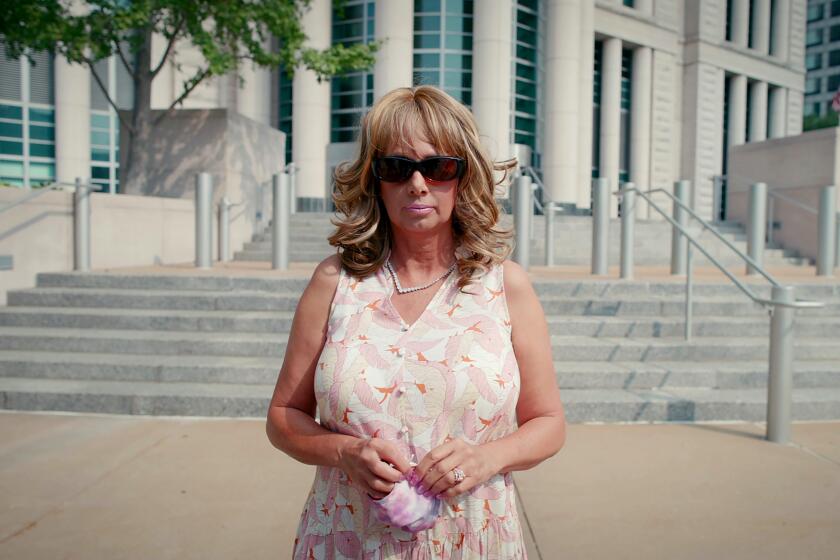Universal’s Rick Finkelstein hits slopes in ‘The Movement’
As the vice chairman and chief operating officer of Universal Pictures, Rick Finkelstein is used to hammering out exceptionally intricate transactions. What he recently had to negotiate on the slopes of a Colorado ski resort was more complicated than any show business contract — his own fears, with a movie camera watching every minute.
In December 2004, Finkelstein was skiing on Aspen Mountain, having recently survived a cancer scare. Distracted while looking for a friend over his shoulder as he raced down the resort’s Kleenex Corner, the veteran skier — “I only ski double black diamond runs” — flew off a precipice, crashing hard into the trees below. He collapsed both lungs, suffered internal injuries and severed his spine.
“When I got to St. Mary’s Hospital, they were amazed I was still alive,” Finkelstein, 62, recalled of his arrival at a Grand Junction trauma center. He spent nearly a month in the hospital’s intensive care ward, an additional three months at Cedars-Sinai Medical Center and underwent nine back surgeries.
Paralyzed from the waist down, he returned to work at Universal. “I never thought I wouldn’t work again,” he said. But he was worried how a town consumed with appearances would see him. “I was really concerned about showing up in a wheelchair. That was my biggest concern — that it would make me look weak,” he said.
Finkelstein, a 12-year veteran of Universal, was recently given new roles working with chairman Adam Fogelson and co-chairman Donna Langley. In addition to overseeing all post-theatrical distribution channels (including home video and television) Finkelstein, who has two daughters in their 20s, supervises the studio’s strategic planning and anti-piracy efforts. He is also on the board of the Motion Picture Assn. of America.
“Rick’s ability to focus his energy on an outcome has always been remarkable,” said Universal Pictures Chairman Adam Fogelson. “His tremendous accomplishments throughout his career — and especially at Universal — are proof of that.”
For all of his success back at the job, though, a return to skiing was far from his mind. And then filmmaker Kurt Miller called.
The son of well-known sports filmmaker Warren Miller, Kurt Miller had a few years earlier launched Make a Hero, a nonprofit organization helping disabled athletes return to their sports. As a fundraising and inspirational vehicle, the younger Miller decided to direct “The Movement,” a self-financed documentary profiling five disabled skiers that has just started playing in limited release around the country.
Miller had plenty of potential people to tell his film’s story, but he needed a leading man — someone around whose struggles and victories the movie could be organized. Finkelstein seemed like the perfect candidate.
“I had heard through happenstance that a senior executive at one of the studios had been disabled while skiing at Aspen,” Miller said. So he called Finkelstein. He didn’t hang up. As any aspiring director might pitch a studio executive, Miller described his movie idea. Yet he wasn’t asking for Universal’s money; he was making a casting decision.
“I knew what [the name] Warren Miller meant,” Finkelstein said. “I’d watched his movies,” which include “White Magic,” “Black Diamond Rush” and “Vertical Reality.” And that did give it some legitimacy.”
But the executive was far from ready to return to the slopes, even if he would be using a special, seated ski designed for the disabled. “I was concerned about looking like a fool — just not being able to do it, falling down,” he said. “My daughter thought I was insane.”
Miller connected Finkelstein with Chris Waddell. Paralyzed at age 20 in a skiing accident, Waddell not only went on to become one of the most decorated skiers in Paralympic history but also to climb the 19,341-foot elevation Mt. Kilimanjaro. After their meeting, Finkelstein was ready to take the next step.
As the 40-minute movie narrated by Robert Redford shows, any number of disabilities have failed to keep determined athletes off the mountain. Jim Martinson lost both legs to a Vietnam land mine. Mike May was blinded at age 3. Traci Taylor was born three months prematurely. All ski remarkably well.
“The Movement” re-creates Finkelstein’s accident and revisits his hospitalization, including a terrifying glimpse of his spinal X-ray. But the documentary’s central story is his return to Aspen in 2010.
The idea of returning “to the scene of the crime,” as Finkelstein puts it, is clearly terrifying. When he is fitted for a monoski in a shop for disabled skiers, the panic on his face is palpable.
Using a monoski is closer to snowboarding than skiing, meaning there’s no shortage of falling. While it’s not far down to the ground, the idea that you have to crash again and again to become even marginally skilled causes Finkelstein more than a few worries, particularly as he nears the boundaries of a run. “Psychologically, I can’t go near the edges,” he says.
But if skiing is a bit like riding a bike, Finkelstein, who still needs regular physical therapy and has chronic pain in his lower body, quickly remembers how to make his way down a mountain, shifting the weight on his edges, using his outrigger poles to help carve soft turns.
Unencumbered by a wheelchair, gravity now works for — rather than against — him. “I haven’t had this feeling in a while,” he says as his skiing improves noticeably, if incrementally. Yet like any competitive athlete, he’s irritated he’s not better. “I don’t have the fear now,” he says after his fourth day on the slopes. “I just have the frustration.”
Miller hopes the film will prompt people with disabilities to tackle seemingly impossible challenges and undergird his foundation. “The goal is to support disabled individuals in all sports,” he said.
With the ski season right around the corner, Finkelstein expects to be back on the slopes soon. Next up, he promises: tennis.
More to Read
The biggest entertainment stories
Get our big stories about Hollywood, film, television, music, arts, culture and more right in your inbox as soon as they publish.
You may occasionally receive promotional content from the Los Angeles Times.











